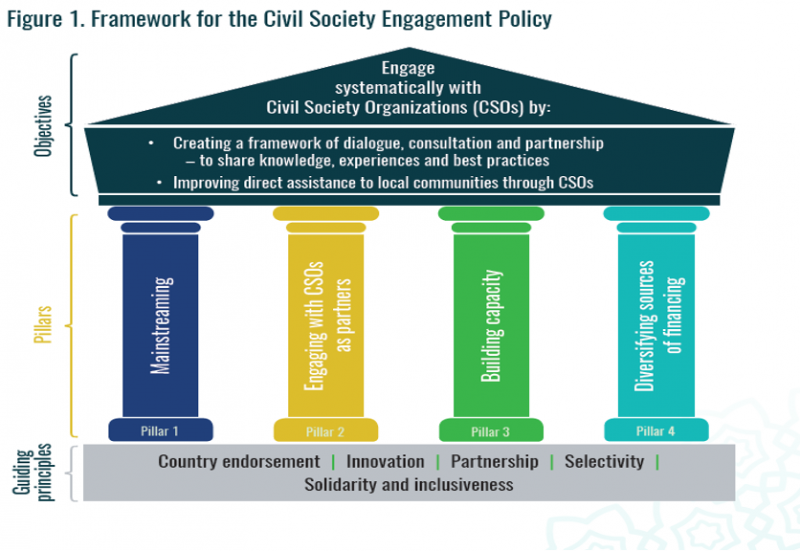Policy & Operational Strategy
In an effort to tackle its Member Countries' challenges and In line with the Global Agenda 2030, IsDB 10-Years Strategy and the President 5-Year Program (P5P), which call for increased participation of Civil Society Organization (CSOs) as the network of developers in IsDB development interventions; the Bank has developed and approved the first-ever Civil Society Engagement Policy in February 2019. The Bank has also developed an “Operational Strategy" of the Civil Society Engagement Policy aiming at setting the strategic priorities, five year action plan, result-based framework and tools to operationalize pillars of the Policy to effectively engage with civil society as “developer-partners”.
IsDB’s Approach
IsDB considers CSOs to be unique partners in development. CSOs bring greater momentum to the Bank’s interventions, and facilitate access to society’s most vulnerable people through their knowledge of local communities. Working closely with CSOs and NGOs enables the Bank to make a real difference in improving people’s lives. With its new Civil Society Engagement Policy – outlined below – the Bank offers a space for civil society to address common problems, advance shared interests and promote collective aspirations. CSOs often complement the socio-economic development efforts of governments, so it is in the Bank’s interest to encourage their participation in and contribution to certain phases of selected projects and operations in its MCs.
In line with the 2030 Agenda, IsDB remains at the forefront of addressing the complicated and diverse challenges faced by its MCs in all economic and social sectors. The 10-Year Strategy and the President’s 5-Year Program (P5P) call for increased participation of CSOs as elements of the network of developers in IsDB interventions. The P5P roadmap expands the Bank’s framework of collaboration with CSOs, aligned with the development efforts pursued by MCs.
Based on this, the Bank has recently developed (2019) its first Civil Society Engagement Policy guided by its transformation agenda, strategic priorities and the SDGs. The Policy is based on a technical policy study and recommendations from a wide range of internal and external consultations with Member Countries, development partners and CSOs.
The purpose of the Policy is to set the Bank’s strategic direction for systematic engagement with CSOs. The Policy aims to create a framework of dialogue, consultation and partnership with CSOs to foster the sharing of knowledge, experience and best practices. It also aims to improve direct assistance to local communities in MCs through CSOs. This Civil Society Engagement Policy recognizes the different types of CSOs and the diverse needs, trajectories and stages of development of the 57 IsDB Member Countries.
The Policy has four pillars. These are:
- Mainstreaming CSOs in in-country engagements, programs and projects
- Engaging with CSOs as partners
- Building capacity
- Diversifying sources of financing
The Policy is also guided by six non-discretionary principles. These are as follows:
- Country Endorsement
- Innovation
- Partnership
- Selectivity
- Solidarity
- Inclusiveness

IsDB Operational Strategy (on-going)
The Operational Strategy aims at:
- Setting the strategic priorities for each pillar of the Policy.
- Developing a five-year action plan and a result-based framework.
- Providing an operational framework to guide the Bank’s staff to operationalize the civil society engagement policy.
The Operational Strategy provides specific mechanisms and modalities to engage civil society. The strategy is aligned with the inclusive social development pillar of the 10-years Strategy of the Bank and the P5P, which call for increased participation of CSOs as network of developers in IsDB development interventions. The Strategy also contributes to increase the role of CSOs in achieving Sustainable Development Goals (SDGs).
The Operational Strategy has been prepared based on extensive internal consultations with the Regional Hubs, Global Practices Departments and other relevant units of the Bank. The strategy has been prepared based on consultations with the Asian Development Bank (AsDB) and the African Development Bank (AfDB).